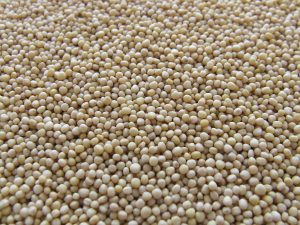
11th Sunday of Ordinary Time – Growth—“Of its own accord”
Mark 4:26-34 | 11th Sunday of Ordinary Time, Year B
Growth—“Of its own accord”
Matthew, Mark, and Luke all tell the parable of the Mustard Seed. The inclusion of the parable in all three synoptic gospels underscores the importance of the message. In all of us, faith starts small. But when it matures, it becomes exponentially more powerful. Only Mark, however, details the actual process of the plant’s growth: “the seed would sprout and grow, he knows not how. Of its own accord, the land yields fruit…the harvest has come” (vs. 27-29).
These verses in Mark apply to all kinds of growth. How does something that weighs just a few pounds grow into the young woman I picked up from college, one with a passion to help the less fortunate in ways that are more than just a Band-Aid? How does that bald scrawny bundle develop into the young man I just witnessed graduate from high school, the one who always pushes me to think in new ways? While I like to think Mark and I aided the process at least a bit, my children’s power existed when they were just a ball of cells, and (believe me), they let it be known.
Jesus wanted to emphasize this power that is in each of us. The right conditions are helpful of course. A good family, food to eat, a faith background, strong schools, all help to nourish people just as good soil and enough water, sun, and nutrients help seeds to flourish. But plants can spring up in the most unlikely places, and power in people can burst forth under the most surprising circumstances.
We never know when what is in us is going to burst forth. My son wanted desperately to be taller than his sister, but for years he had to look up to her. Then one summer—bam!— he grew seven inches. One afternoon, I visited my daughter her first summer as a camp counselor, and I saw a person who had truly grown into her own skin. She had grown seven inches too, but her growth wasn’t physical. The thing is, I couldn’t make either of those spurts happen. Nor was I responsible to do so. The same is true for faith.
We aren’t responsible for another’s faith. God gifts us our power and abilities, and we should use them to help others, but God alone is the author and creator. We are mere assistants. That reality should be freeing. It doesn’t resolve us of all responsibility in creating as optimal conditions as possible for another’s faith (and all) growth, but it does free us of the final responsibility.
Ultimately, we don’t understand how growth occurs. Science explains to a point—bones need calcium to grow— but there’s still the why. Why is calcium the necessary nutrient? It’s a mystery. The mystery of faith. God unleashes our growth and our power at the optimum time, and then and only then do we “yield fruit [because] the harvest has come.”


